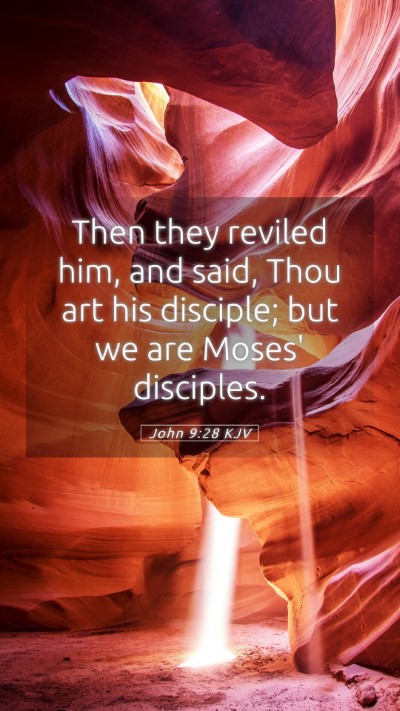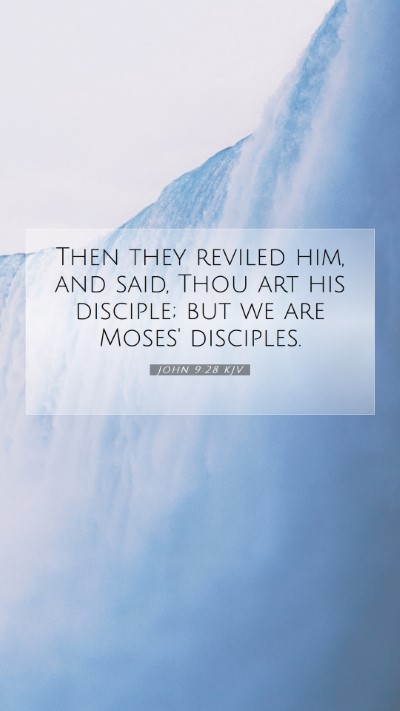John 9:28 - Bible Verse Interpretation and Commentary
Verse: "Then they reviled him, and said, Thou art his disciple; but we are Moses' disciples." - John 9:28
Overview of John 9:28
This verse is a part of the account of Jesus healing a man born blind. In the surrounding context, the healed man is confronted by the Pharisees, who challenge his testimony about Jesus. Their reviling indicates a rejection of both the miracle and the one who performed it—revealing their own spiritual blindness.
Exegetical Insights
- Context of the Verse: This scene illustrates the growing tension between Jesus and the religious leaders of the time. Being a disciple of Jesus placed the healed man at odds with the religious authorities.
- Reviling Motif: The term "reviled" indicates a harsh and derogatory rejection, reflecting the Pharisees' defensiveness regarding their authority and tradition.
- Moses vs. Jesus: The contrast drawn between being a disciple of Moses and a disciple of Jesus suggests a deeper theological debate over the authority of the Law versus Christ's teachings, highlighting the Jews' reliance on Mosaic Law.
- Implications for Believers: This interaction serves to underscore the necessity of faith in Christ over adherence to tradition, a theme prevalent throughout John's Gospel.
Commentary Summaries
Matthew Henry's Commentary
Matthew Henry interprets this verse as a manifestation of the conflict between true faith and Jewish legalism. He points out that the Pharisees' reviling is emblematic of spiritual pride, which often persecutes truth. Henry emphasizes the irrationality of rejecting Christ while claiming to follow Moses, as Jesus himself is the fulfillment of the Law.
Albert Barnes' Commentary
Albert Barnes highlights the Pharisees' rejection of the healed man's testimony as an example of their refusal to acknowledge the truth of Christ's miracles. He points out that the Pharisees adhered to tradition rather than seeking understanding or truth, leading them to dismiss Jesus by appealing to their own religious heritage.
Adam Clarke's Commentary
Adam Clarke provides a detailed analysis, emphasizing the contrast between the identities of Jesus’ followers and those of Moses. He explains that the conflict illustrates the broader struggle between the old covenant and the new covenant brought forth by Christ. Clarke points out how this reveals the challenges believers face when standing firm in faith against prevailing cultural norms.
Significance of the Verse
The significance of John 9:28 lies in its confrontation of religious authority and the power of personal testimony. This encounter illustrates how fear of cultural rejection can often lead individuals to forsake truth and embrace false authority.
Application for Modern Readers
This verse teaches about the importance of standing firm in one’s faith amidst opposition. In contemporary settings, believers are encouraged to testify boldly about their experiences with Christ, despite potential backlash.
Cross References
- John 5:45-47 - Jesus addressing the reliance on Moses' writings.
- Matthew 5:11-12 - The blessings associated with being reviled for righteousness.
- Acts 5:29 - The apostles' declaration of obedience to God over human authority.
Conclusion
In exploring John 9:28, readers gain valuable insights into the dynamics of faith, authority, and the challenge of unwavering belief in Jesus Christ. Understanding Scripture in its context enriches the meaning of Bible verses and promotes deeper Bible study insights.


